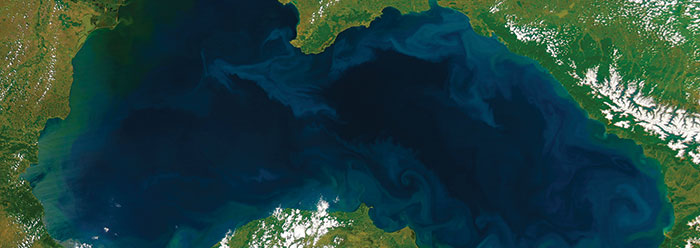Robert Ballard, the underwater explorer who became famous for discovering the wreck of the Titanic, recently claimed to have found evidence for Noah’s Flood in the Black Sea.1 Could this be true?
Although Ballard mentions Noah’s Flood, he does not believe in the worldwide Flood that is so clearly described in Genesis 7:19-24. Nor does he believe Noah actually built an Ark or even that Noah was a real person. Rather, he has come to accept the “Black Sea Deluge” hypothesis,2 which states that catastrophic, but local, flooding occurred when a rising Mediterranean Sea pushed enormous amounts of water over the Bosporus (a strait between Europe and Asia) into the Black Sea. The Black Sea is thought to have been a freshwater lake at the time of the event, and this flooding is believed to have increased both its depth and size. Some secularists claim this Black Sea Deluge eventually inspired the story of Noah.
In this view, the biblical Flood account is nothing more than a myth based upon faint recollections of a catastrophic, local flood.
But if the Genesis Flood is a myth, then why are stories of a global flood found throughout the world? And why are many of these narratives remarkably similar to the biblical account?3 The existence of such stories is exactly what one would expect if the Flood of Noah were a real, historical event. Noah’s family would have remembered this cataclysmic event and passed those recollections on to their descendants. Some of the stories became garbled over time, but other accounts retained remarkable similarities to Genesis’ accurate, divinely inspired account. If such stories did not exist, wouldn’t these same skeptics cite the absence of such recollections as proof that the Genesis Flood never happened?
Moreover, the biblical account is by far the most sober and credible of all these flood narratives. In fact, an Ark built to the specifications described in Genesis would have been extremely seaworthy.4
The real Genesis Flood explains the existence of water-formed sedimentary rock layers that cover much of the earth’s surface. Entombed within these layers are the fossilized remains of billions of animals that were rapidly buried, many of them in massive fossil “graveyards.”
The Genesis Flood can also explain this smaller Black Sea flood. It was likely caused by an increase in ocean level resulting from melting ice sheets toward the end of a single post-Flood Ice Age. During the Flood cataclysm, hot material from the earth’s interior would have significantly warmed the post-Flood oceans. This would have resulted in increased evaporation, leading to massive precipitation falling as snow at higher latitudes. Extensive volcanic eruptions during and after the Flood ejected aerosols into the atmosphere. These aerosols reflected significant amounts of sunlight back into space, resulting in cooler summers. These cooler summers prevented snow and ice from melting and grew the high-latitude ice sheets. Toward the end of the Ice Age, when the ice sheets eventually melted, catastrophic localized flooding occurred, including the Black Sea Deluge.5
God’s global judgment on the sinful pre-Flood world was a real historical event, and it cannot be relegated to a mere local flood. Evidence of the Flood demonstrates that God has judged sin in the past—and He will also do so in the future (2 Peter 3:7)—as the worldwide distribution of rocks and fossils bears mute but eloquent testimony.
References
- Millman, J., B. Taylor, and L. Effron. Evidence Noah’s Biblical Flood Happened, Says Robert Ballard. ABC News. Posted on abcnews.go.com December 10, 2012, accessed December 20, 2012.
- Ryan, W. and W. Pitman. 1998. Noah’s Flood: The New Scientific Discoveries About the Event that Changed History. NY: Simon & Schuster.
- Cooper, B. 2012. The Authenticity of the Book of Genesis. Portsmouth, UK: Creation Science Movement.
- Hong, S. W. et al. 1994. Safety Investigation of Noah’s Ark in a Seaway. Journal of Creation (Formerly TJ). 8 (1): 26-34.
- Oard, M. 2011. Two More Late Ice Age Megafloods Discovered. Journal of Creation. 25 (1): 4-6.
* Dr. Hebert is Research Associate at the Institute for Creation Research and received his Ph.D. in Physics from the University of Texas at Dallas.
Cite this article: Hebert, J. 2013. Was the “Black Sea Deluge” the Flood of Noah? Acts & Facts. 42 (3): 17.




